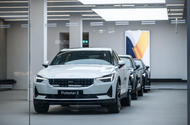Polestar was an early proponent of the agency model
Tesla, Polestar, Mercedes and now Ford: many car makers are switching to agency – but does it make sense?
The switch of new car sales to an agency model (the sale of cars at a fixed price controlled by and sold by the manufacturer) has started in earnest, but as it moves from theory to practice the holes are already starting to emerge.
Mercedes-Benz made the switch to agency at the start of the year, and plenty of others say they are set to follow, most recently Ford, which announced plans to shrink its European retail network and pursue a close relationship with customers last week.
Agency was here already, of course, with newcomers Tesla and Polestar already adopting direct sales (though Tesla now has more than 40 physical ‘stores’ in the UK, and more than 200 in the US, 60 of which are in California), yet Mercedes is the first brand with traditional bricks-and-mortar dealerships to transition from the ‘old’ way of selling cars to agency. Its sales were down 21% year-on-year in the UK in January, though there are too many variables at play to read too much into agency’s role in that.
Perhaps if you were starting again with car sales and there was no legacy way of doing so, or you are a premium brand with an image to control and protect, agency might be the way to go. Yet there’s a very well proven and well established way of selling cars, and whatever you might think of them, car dealers know what they’re doing and know what they’re talking about.
Agency doesn’t seem like the runaway train it once was. Stellantis and the Volkswagen Group (according to a report in Car Dealer Magazine this week) are among those delaying agency plans, as car makers confront just how complex a process it is to set up, to get ‘dealers’ on board with, and to then staff and implement.
“The current model isn’t broken,” Kia UK boss Paul Philpott told me when asked whether his brand would be going to an agency model. “People like people.” He added that he “struggled to see the benefits” and that there were “hidden costs” in the agency model.
Those car makers making the switch to agency argue that customers hate variable pricing, and have a lack of trust in dealers to give them a fair price. People don’t like haggling, pro-agency folk say, and thinking you’ve got a bad deal or paid more than another buyer for the same car can undermine any enjoyment you get from owning the car itself.
In giving manufacturers control over the whole process, agency of course allows prices to be set. A more suspicious mind might see that those prices are likely to be set higher than competitive market conditions otherwise might dictate… And who ends up paying more then? Is that fair?
Our sister brand What Car? offers Target Price data on every new car on sale, and the average discount on a new car has historically been around £1500-£2000 off list price. If cars are sold at list price with agency, that’s anything up to two million car sales a year in this country having as much as £2000 extra spent on them than is needed, some £4 billion in total.
On the evidence so far, the only real winners buying cars through agency seem to be those who are better off financially, time poor, and unconcerned about value.
Source: Autocar
